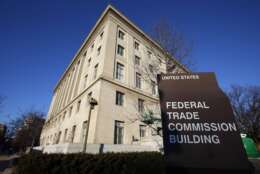National & World Headlines
-
President Joe Biden has signed an executive order that would create the White House Office of Environmental Justice. The president says ” The White House says the Democratic administration wants to ensure poverty, race and ethnic status don't lead to worse exposure to pollution and environmental harm. Biden wants to draw a contrast between his agenda and that of Republicans. GOP lawmakers have called for less regulation of oil production to lower energy prices. The Biden administration says the GOP's policies would surrender the renewable energy sector to the Chinese.
April 21, 2023 -
A senior Republican on the Senate Judiciary committee has demanded that U.S. Drug Enforcement Administration chief Anne Milgram address allegations of improper hiring and contracting of her past associates. The request Thursday by Sen. Chuck Grassley of Iowa follows an investigation by The Associated Press finding that a federal watchdog is investigating whether strict federal rules on no-bid contracting and hiring may have been violated to channel DEA work to Milgram’s associates. The scrutiny by the Justice Department’s Office of Inspector General comes as the DEA is struggling with repeated revelations of agent misconduct and a fentanyl crisis claiming more than 100,000 overdose deaths a year.
April 20, 2023 -
A federal watchdog is investigating whether the U.S. Drug Enforcement Administration under chief Anne Milgram improperly awarded millions of dollars in no-bid contracts to hire her past associates. Among the spending under scrutiny by the Justice Department’s Office of Inspector General is $4.7 million for “strategic planning and communication” and other contracts that were used to hire people Milgram knew from her days as New Jersey’s attorney general and as a New York University law professor – at costs far exceeding pay for government officials. DEA declined to comment specifically but said in a statement it has acted to “set a new vision.”
April 19, 2023 -
President Joe Biden has signed an executive order containing more than 50 directives to increase access to child care and improve the work life of caregivers. But the White House said Tuesday the directives in the order would be funded out of existing commitments. That likely means the directives' impact would be limited and they'd carry more of a symbolic weight. The Democratic president was more ambitious in 2021 by calling to provide $425 billion to expand child care, improve its affordability and boost wages for caregivers. White House Domestic Policy Council director Susan Rice says the order shows Biden isn’t waiting on Congress to act.
April 18, 2023 -
Democrats’ efforts to temporarily replace California Sen. Dianne Feinstein on the Senate Judiciary Committee are meeting quick opposition from some Republicans. Feinstein last week asked to be temporarily replaced on the Senate Judiciary Committee while she recuperates in her home state from a case of the shingles. Senate Majority Leader Chuck Schumer said Monday that he is moving forward, but it’s unclear if Democrats will have the votes. Republican Sens. Tom Cotton and Marsha Blackburn both indicated they would object. The Judiciary Committee handles nomination to the federal courts. Several of President Joe Biden's judicial nominees are on hold due to Feinstein's medical absence.
April 17, 2023 -
Senate Republican leader Mitch McConnell is back at work in the U.S. Capitol, almost six weeks after a fall at a Washington-area hotel and undergoing extended treatment for a concussion. The 81-year-old Kentucky Republican has been recovering at home since he was released from a rehabilitation facility March 25. He fell after attending an event earlier that month, injuring his head and fracturing a rib. On Monday he criticized President Joe Biden for not doing enough to negotiate on the nation’s debt ceiling and thanked his colleagues for their well-wishes. He joked that "this wasn’t the first time that being hard-headed has served me very well.”
April 17, 2023 -
Step into a U.S. military recreation hall at a base almost anywhere in the world and you’re bound to see young troops immersed in the world of online games. The enthusiasm military personnel have for gaming — and the risk that carries — is in the spotlight after a 21-year-old Massachusetts Air National Guardsman was charged with illegally taking and posting highly classified material on a social media platform that started as a hangout for gamers. Online gaming forums have long been a particular worry of the military because of their lure for young service members. And U.S. officials are limited in how closely they can monitor those forums to make sure nothing on them threatens national security.
April 14, 2023 -
The Supreme Court is allowing challenges to the structure of two federal agencies to go forward in federal court. The high court ruled unanimously Friday to allow challenges to the structures of the Federal Trade Commission and the Securities and Exchange Commission to go forward in federal court. In one case, the FTC had brought an enforcement action against Axon Enterprise, the Arizona-based company best known for developing the Taser, arguing that its purchase of its competitor Vievu for approximately $13 million was improper. The other case involved an SEC enforcement action against Michelle Cochran, a certified public accountant. Axon and Cochran responded by suing in federal court and arguing that the structure of the FTC and SEC respectively are unconstitutional.
April 14, 2023 The Supreme Court is allowing a roughly $6 billion legal settlement to go forward that will cancel student loans for hundreds of thousands of borrowers who say they were misled by their schools. The justices didn't comment in rejecting an emergency plea from Everglades College, Lincoln Educational Services Corp. and American National University. The schools had argued they were unfairly included on a list of more than 150 institutions, most of them for-profit, that were linked with alleged misconduct. The justices’ action comes as the high court is weighing what to do with the Biden administration’s plan to wipe away $400 billion in student debt held by more than 40 million people.
April 13, 2023Federal officials say they have asked the FBI to consider criminal charges against more than 250 unruly airline passengers since late 2021. The Federal Aviation Administration said Thursday that 17 of those cases have been referred to the FBI in the first three months of this year. That's a slower pace, and it seems tied to a decline in passengers acting up on planes since a judge struck down the requirement for passengers to wear masks. The FAA can levy civil fines for misbehaving on planes, but it has to ask the FBI to file criminal charges in the most serious cases.
April 13, 2023-
The Pentagon says online leaks of scores of highly classified documents about the Ukraine war present a “very serious” risk to national security and senior leaders are quickly taking steps to mitigate the damage. In the days since Defense Secretary Lloyd Austin became aware of the leaks, he's reached out to top allies, convened daily meetings to assess the damage and set up a group not only to assess the scope of the information lost but review who has access to those briefings. And as the public airing of the data sends shockwaves across the U.S. government, the White House says there are concerns there could be additional leaks.
April 10, 2023 -
The Justice Department has launched an investigation into the possible release of Pentagon documents that were posted on several social media sites and appear to detail U.S. and NATO aid to Ukraine, but may have been altered or used as part of a misinformation campaign. The documents, which were posted on sites such as Twitter, are labeled secret and resemble routine updates that the U.S. military’s Joint Staff would produce daily but not distribute publicly. They are dated ranging from Feb. 23 to March 1, and provide what appears to be details on the progress of weapons and equipment going into Ukraine with more precise timelines and amounts than the U.S. generally provides publicly.
April 07, 2023 -
Republican House Speaker Kevin McCarthy says he’s growing increasingly concerned about President Joe Biden’s unwillingness to negotiate on lifting the nation’s borrowing authority. He says in a letter to the president dated Tuesday that the White House position “could prevent America from meeting its obligations and hold dire ramifications for the entire nation.” The White House says McCarthy and the Republicans are to blame, refusing to put forward their own budget plan before formal negotiations. The Treasury Department has resorted to “extraordinary measures” to avoid default on the nation’s $31.4 trillion borrowing authority. But those measures will run out, possibly as early as June.
March 28, 2023 -
The U.S. government will restrict its use of commercial spyware tools that have been used to surveil human rights activists, journalists and dissidents around the world. President Joe Biden's order responds to growing U.S. and global concerns about programs that can capture text messages and other cellphone data. Some programs — so-called “zero-click” exploits — can infect a phone without the user clicking on a malicious link. While the U.S. and other governments routinely collect huge amounts of data, advocates warn that the commercial spyware market creates new opportunities for abuse and repression.
March 27, 2023 -
At least one program of the EPA has had consistent support regardless of the administration or the makeup of Congress. It's called WaterSense and it's aimed at plugging household leaks thought to result in billions and billions of wasted gallons.
March 24, 2023













